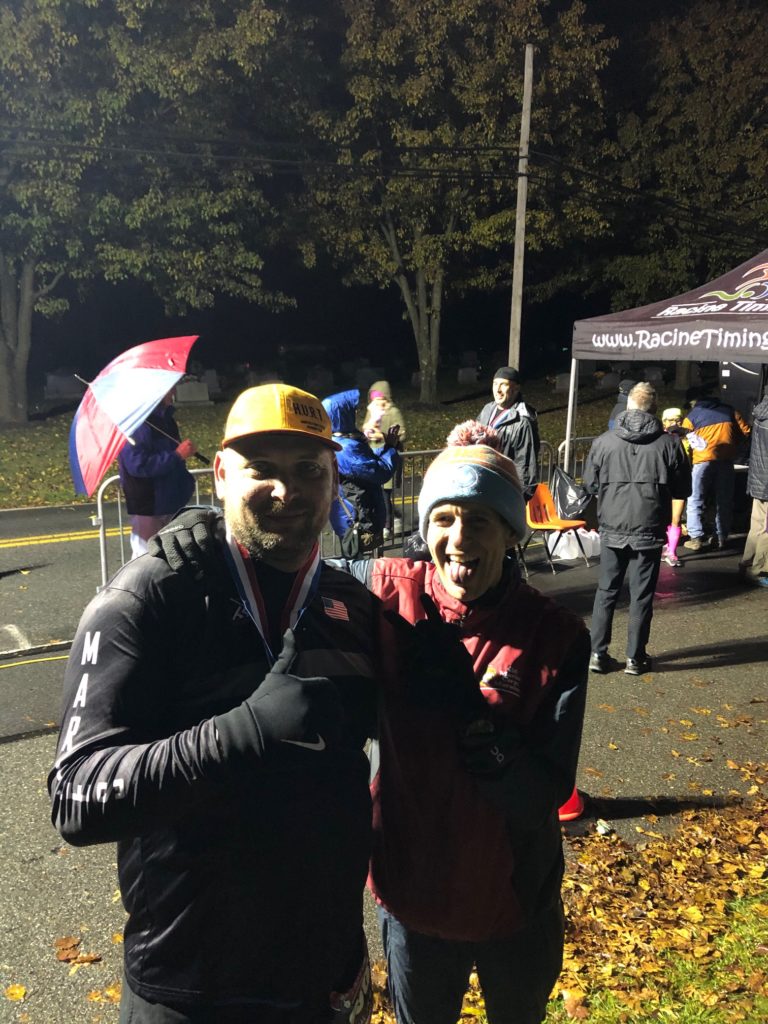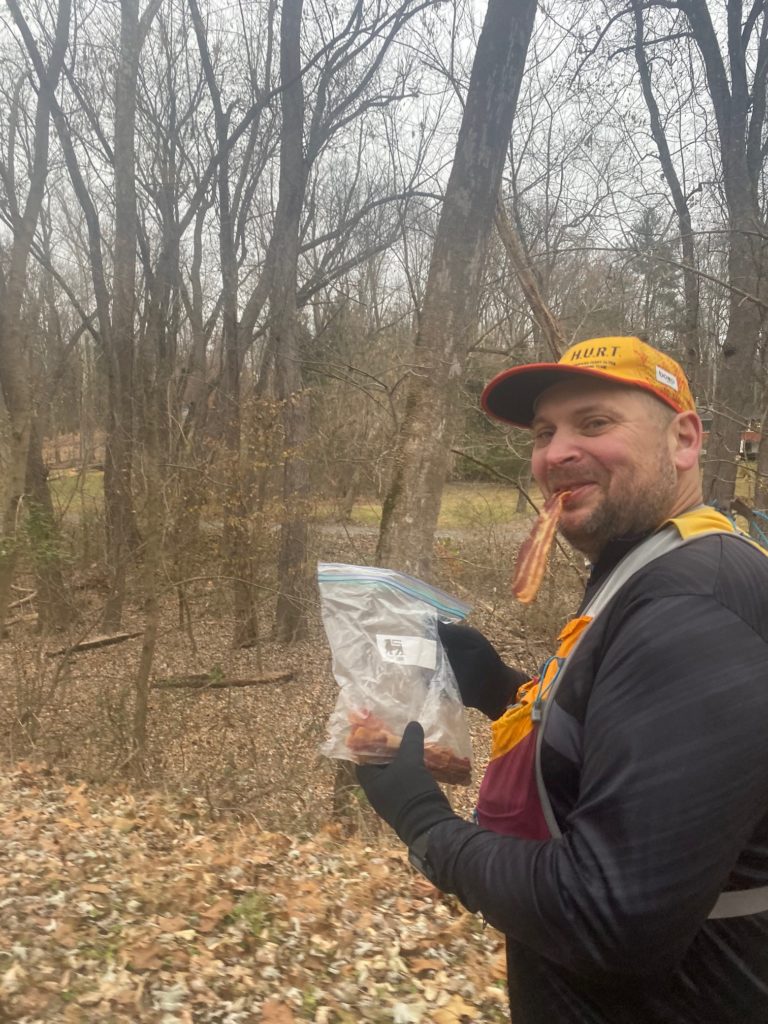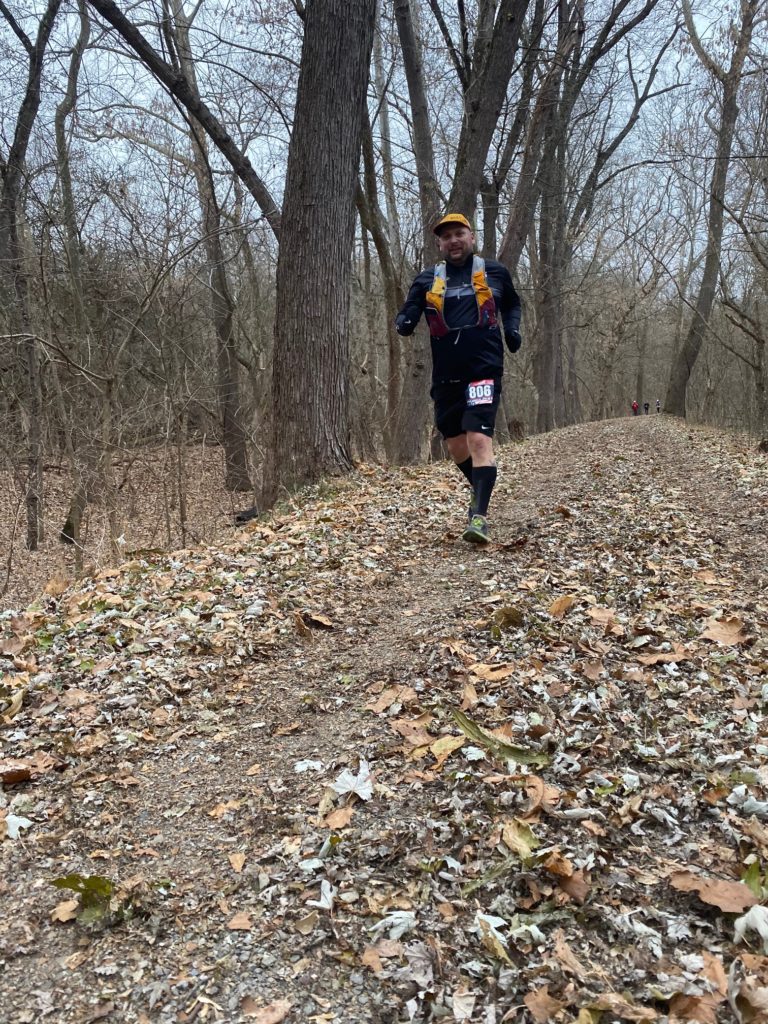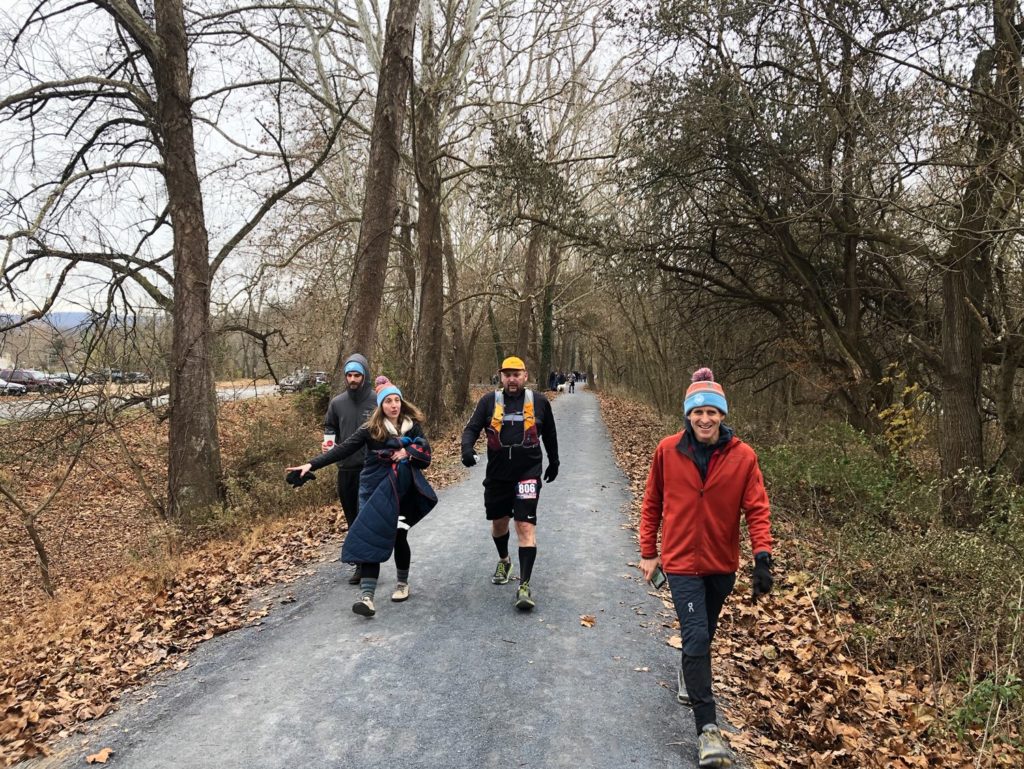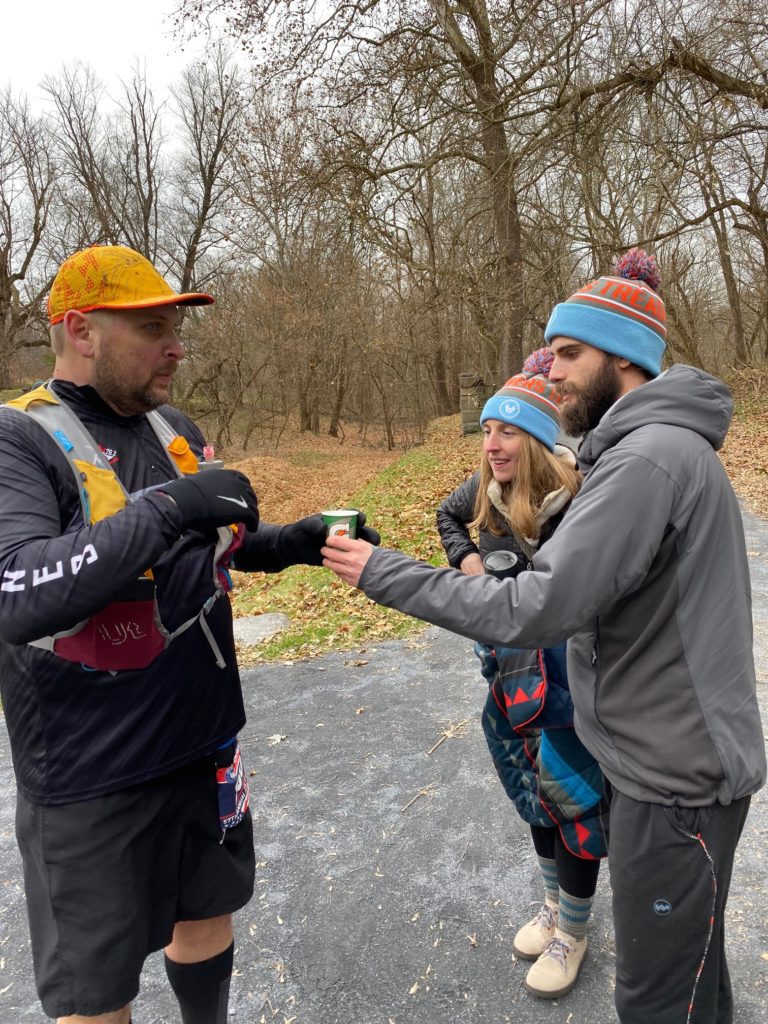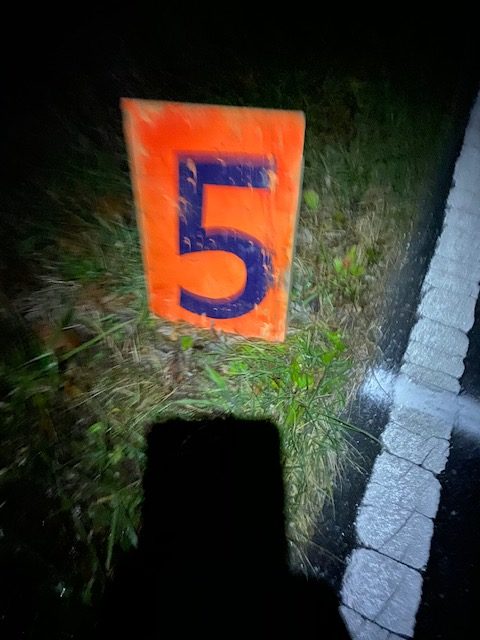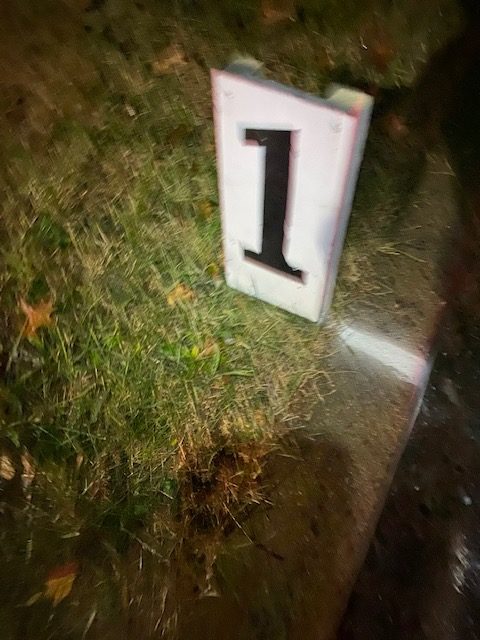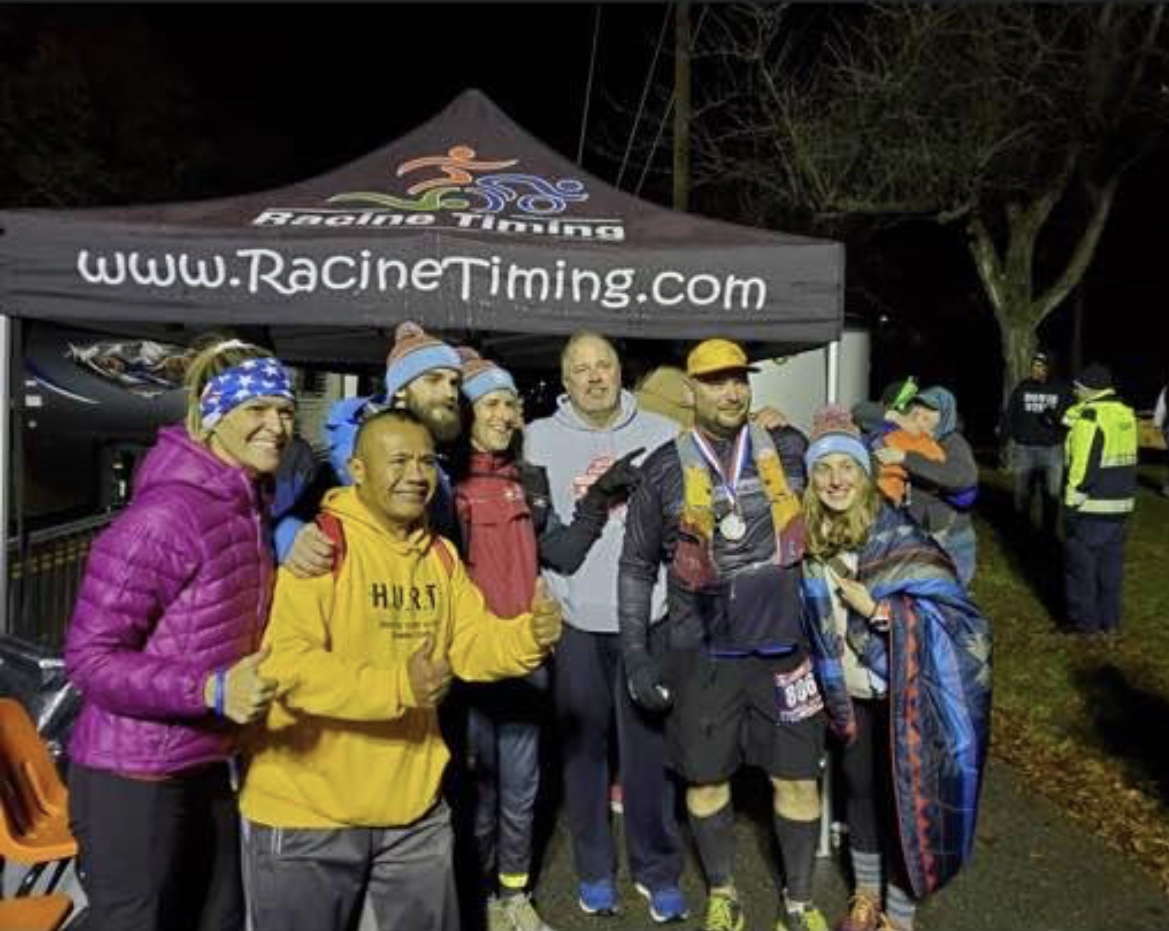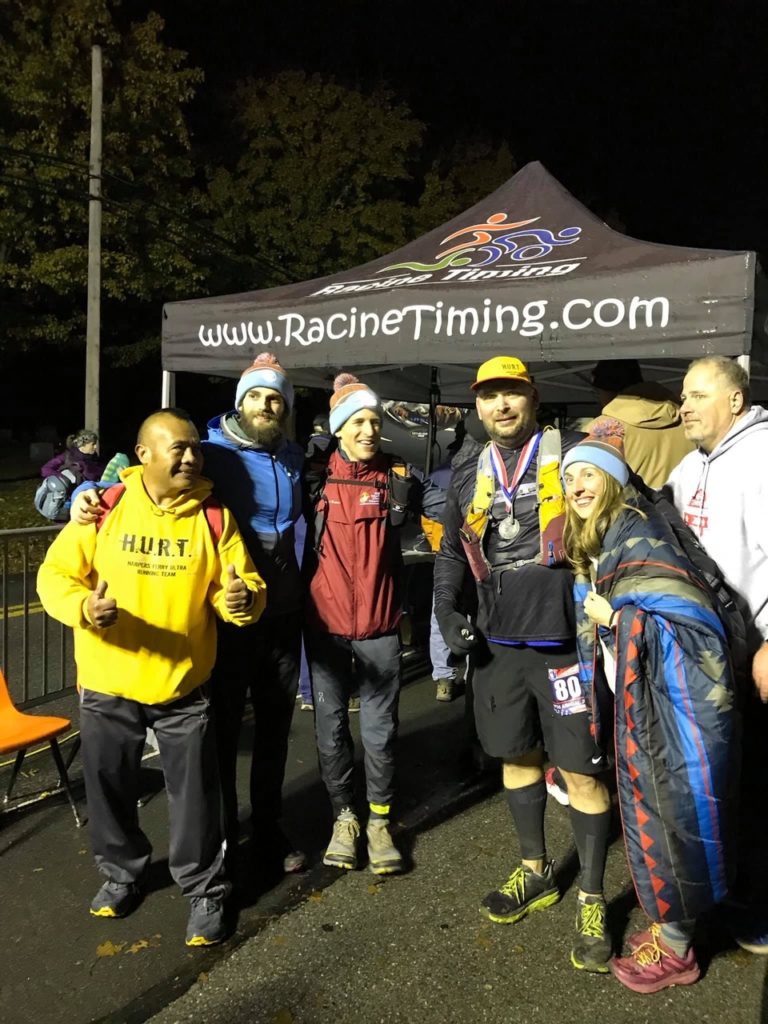Two weeks ago it was a privilege to run with my friend Travis Muehleisen during the final half of his 4th attempt at the JFK 50 mile.
I wrote about Travis on this blog 3 years ago. and also in Blue Ridge Outdoors
Travis is in inspiration to us all with his amazing story of recovery and how running has shaped his mental and physical health. Travis is a steel worker and had catastrophic injuries and 4 spine surgeries leading to opiate use disorder. On disability, massively overweight, and addicted to opiates he woke up one day nine years ago and wanted to live. . Grit and steely determination has returned him to steel work (yes come off disability) and guided him to the finish this year in his 4th attempt at this very difficult race. Friends and family were there at the finish to bring him in 15 minutes before the 13 hour finish cut off.
What made you want to challenge yourself to the JFK 50 Miler?
I was getting pretty good at the marathon distance and just wanted to see how far I could push my body and mind, so I started looking into new distances to challenge myself. I’ve always heard of the JFK 50 from running in general, so I looked into the race and quickly realized that this was not just any race, it actually held meaning like the Marine Corps Marathon and Freedom’s Run. I love races that have meaning to me, and considering it also local, my mind was made up to attempt it. I just never thought that it would become a 4 year journey to cross the finish line.
Tell us a little about your first three attempts and things you learned that helped this year.
My first attempt was in 2016 and that year humbled me, giving me a taste of what this ultra running is all about. I had no clue what to expect. I did not know how to train for an ultra, and I had no idea what it would take to get 50 miles done. I showed up in marathon distance shape, and it didn’t take long for me to realize that I was in for a long day. I learned that when doing an event that long you really have to prepare for all of the elements. At around mile 30 or so, a storm blew in out of nowhere packing high winds, rain and sleet, and consequently, I timed out at mile 38.
*note- the JFK 50 has cut times so if you do not make specific points at the cut time you are removed from the course
In 2017, I trained harder and incorporated more trail running. I thought that I trained enough this time around to get to that finish, but I came up just a few minutes short at mile 46. My lesson for year 2 was not to hang around in aid stations very long, as every minute counts in an ultra, but even after my second JFK DNF, I was still optimistic that I could finish this race in the future.
In 2018 I had a rough year in the closing months of training. I injured my calf during the Freedoms Run Marathon in October, which turned into a long recovery battle, and I was unable to run again until the Marine Corps Marathon, and then not again until JFK just a few weeks later. A few days before the race, we had a snowstorm that made conditions terrible but I knew to prepared for everything in an ultra and on race day, I was fortunate to have amazing support on and off the course. I was a few minutes short when I reached mile 38 and could not continue on to complete the race, but I felt differently than I did after my two prior attempts. One of the first things that I said after the race is that I was done. I gave it three good attempts and I had no more to give. It just wasn’t meant to be and I had no intentions of a fourth attempt.
It wasn’t until June 2019 that I decided to try JFK once more, this time hiring a coach for the first time. As time passed after 2018, I continued to think about my attempts and I wanted to finish what I started. I made the statement in previous years that I do these things for the people with disabilities and addictions that don’t think they can, and I wanted to stick to that commitment. I would have always wondered if I could have finished had I never tried this again.
You had an injury earlier in the fall, did this put some doubt into your training?
My training was on point this year. I ran more trail than road and dedicated all training to JFK. I also learned so much from my friends about how to finish an ultra. However, I was on a training run coming down the switchbacks in Weverton (section of Appalachian Trail) when I rolled my ankle. My first thought was that it was broken and there was no chance I would run JFK this year. My second thought was how I would make it off the mountain. I made it, and my ankle wasn’t broken, but I was badly injured. However, my coach, David Welch of Plant Power Running transitioned my training to cycling for four weeks to allow for healing and though I did not have much time to test it out, by the time I ran Marine Corps Marathon in October, I made it through the race with minimal pain (I think the rain during that race kept my mind off of it). Finishing MCM left me with a month to get ready for JFK and I finished my training back on schedule.
You have been in recovery now for 9 years. What role do you think exercise and community and friendship plays in this?
It has been everything. The running community and just the community in general helped me on this journey. I have met amazing people along the way that I will be grateful for for the rest of my life. If not for the running community and my family and friends, I am not sure what my life would have become or if I would even have a life to talk about.
Who have been your biggest supportors to help you train for this race?
This will be a big list but in sum, it’s my friends and family. I hope I do not forget anyone, and this list isn’t everyone, but it’s all who heard me complain for four years and helped me keep trying: Travis and Rebecca Roberts who have been and are great friends of mine. Steve Redding for training with me and for being there for me during all three JFK attempts, driving all day from start to finish to meet me at the course stops. Tasha Fellers for introducing me to running. Manuel Ramos, Mark Cucuzzella, Ryan Kidwieller, Katie Thompson, Jennie Brackens, Paul Koczera, Dion Navara, Marilyn Ludwick, and Sarah Hodder (Sizdo) who are so inspiring to me and are such amazing runners and friends (keep inspiring runners like me). My coach, David Welch at Plant Powered Running, who I thank for being patient with me and getting me to the starting line pretty healthy. John Seyle, a great friend and buddy. Marty Johnson whose support I appreciated on course. Lastly, my entire family who have been so great. My mom is my biggest supporter and I think she felt every failed attempt at this race more than I did. My sister is also a huge support. My kids Jordan and Jessica. My Aunt Jerri, Aunt Donna. This list could go on for a long time, but I’m grateful for everyone in my life and thank all for their support.
What has been the biggest challenge in preparation?
My biggest challenge was within me and my mind. Running takes such commitment and sacrifice. Staying healthy was tough also.
Did you have any doubts in your head on race day that you were not going to make time cut offs?
I can remember telling a friend the night before that it was going to be close again, but that I thought I could make it this year. After I finished the AT (Appalachian Trail), I knew I was in pretty good shape, and I still felt good mentally and physically. Then, when I got to the mile 27 cutoff I was still in good shape with my time and the amazing crew I had with me assured me all day long that I was in a good place (I had amazing support on course). I was pretty confident I could make it at mile 42 when I finished the canal and then at the mile 44 aid station, I was reassured again that I was doing ok. That was the point when I knew I was going to make it. I also know Mark was not going to let me not make it and he kept my mind focused on other things that helped me keep going.
Any goals in the future in your running?
2020 is going to be a great running year. I have a few things planned, including the Miners Lady 8 Hour endurance trail run, Highlands Sky 40 Mile, my first Ragnar Trail Ultra, Freedom’s Run, and the Marine Corps Marathon. I will also return to JFK in 2020 with a new set of goals. I guess this is a good place to say that running 100 miles has entered my thoughts as well.
Are there any bigger messages you want to share with others who are trying to recover and get their life and health back?
The first thing I would say is to ask friends or family for help. I find in most cases that if you ask another person for help, they will help you. You just have to ask for it, and if you’re not in recovery but you want to be, it’s like everything in life, it takes commitment. My success in this is more important than any race I will ever run. Also, once you make up your mind, find a hobby that keeps you occupied and challenged (it doesn’t have to be running). If you are just recently in recovery, keep working hard at staying in recovery. There is a light at the end of the tunnel, just keep doing a good job and never give up. Do not think that just because you are an addict or recovered addict that you are a bad person. Sure, we all make bad choices in life, but we can overcome all of them. There is a life after addiction and it’s very nice. If I can ever help in any way I’m very easy to contact. My biggest message is don’t give up. Do whatever it takes to get happy and clean. It will be the biggest accomplishment of your life, and your family and friends will be so proud of you. Just remember the people who stick beside you and support you through your journey and who love you. You will need that, as not everybody has your best interest at heart, and you will know who these people are, you just have to recognize them. I wish everybody the best on the journey of recovery and happiness and if I can ever be of any help, please don’t hesitate to ask.
Anything else?
A friend and I have been thinking about starting a little running/hiking and walking group in the spring for people like me wanting to come out and just move. This group would not be limited to just people in recovery, it would be open to all, but if you are in recovery or want to be, maybe if you need to lose some weight or find greater health, you will be welcome. Hopefully this idea will become a reality.
